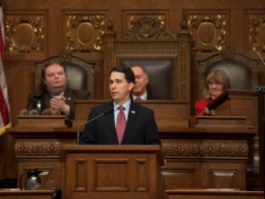
|
|

CONTACT ME:
State Capitol
Room 307 West
P.O. Box 8953
Madison, WI 53708
Phone: (608) 266-5780
Toll Free: (888) 534-0095
rep.billings@legis.wi.gov
![]()
![]()
|
COMMUNITY EVENTS |
American Southwest Exhibition
Description: On his explorations across the American Southwest,
photographer Chris Hood captured the beauty of locations in Utah and
Arizona from angles that would be typically unseen by most human eyes.
Date: Wednesday, Feb. 25 - Sunday, April 4.
Location: The Pump House Regional Art Center
La Crosse Bike Swap
Description: Come to the swap to re-home your dusty bikes, parts,
and accessories. Any bikes unsold at 2 pm must be picked up or they
will be donated to Logan Bike Works.
Date: Saturday, Feb. 28, 10 a.m. - 2 p.m.
Location: Logan Middle School
|
FUN FACT |
Did you know that Wisconsin is one of the top producers of honey in the nation? With over 63,000 honey colonies in the state, honey makes a significant contribution to Wisconsin's economy.
Here are a few little-known facts about Wisconsin honey:
- In 1977, the honey bee was declared Wisconsin's state insect
- In 2012 alone, Wisconsin produced 4.35 MILLION pounds of honey – the same weight as 290 adult elephants.
-
Honey is among
Wisconsin's third largest group of exports, which
also includes dairy and eggs.
Friends and Neighbors,
Welcome to my biweekly newsletter. This week's newsletter will focus on the many new provisions of the Wisconsin State Budget.
On February 3, Governor Walker announced the state budget, which included a number of funding cuts to public programs such as education, healthcare, and transportation. The proposals were met with criticism on both sides of the aisle, as they could bring unwelcome changes to our Wisconsin neighbors and families.
While the budget proposed by Gov. Walker is only a proposal and will incur some changes, it is increasingly important that legislators work together to combat changes that could be harmful to our working families. Now more than ever, we need to come together to create commonsense solutions, repair our economy, and improve our state.
Continue reading this
week’s newsletter for more information on the state budget.
Best Wishes,

Jill Billings
State Representative
95th Assembly District
|
Gov. Walker's State Budget: Top 5 |
|
SeniorCare in Wisconsin is once again at risk.
|
|
February is American Heart Month |
|
February is the American
Heart Association's "American Heart Month." Heart disease is the
leading cause of death for men and women in the United States.
Every year, 1 in 4 deaths are caused by heart disease.
|
|
Expanding Internet Access to Rural Areas |
|
This week, I introduced my first legislation of the 2015-2016 session. LRB-1505 is a bill that extends the 2013 Broadband Expansion Grant Program to allow school districts, technical colleges, and public library boards to apply for grants to increase high-speed internet access in their communities.
|
If you would like to have your name removed from this email list, please reply to this message with “Unsubscribe” in the subject line
 Last week, Governor Walker introduced the
2015-2017 state budget. The budget involved a number of
steep cuts to public programs, and some surprising new
rules. A few of the cuts -- public education and higher
education -- had been announced before the budget was
released, and gained a significant amount of public
opposition.
Last week, Governor Walker introduced the
2015-2017 state budget. The budget involved a number of
steep cuts to public programs, and some surprising new
rules. A few of the cuts -- public education and higher
education -- had been announced before the budget was
released, and gained a significant amount of public
opposition. 